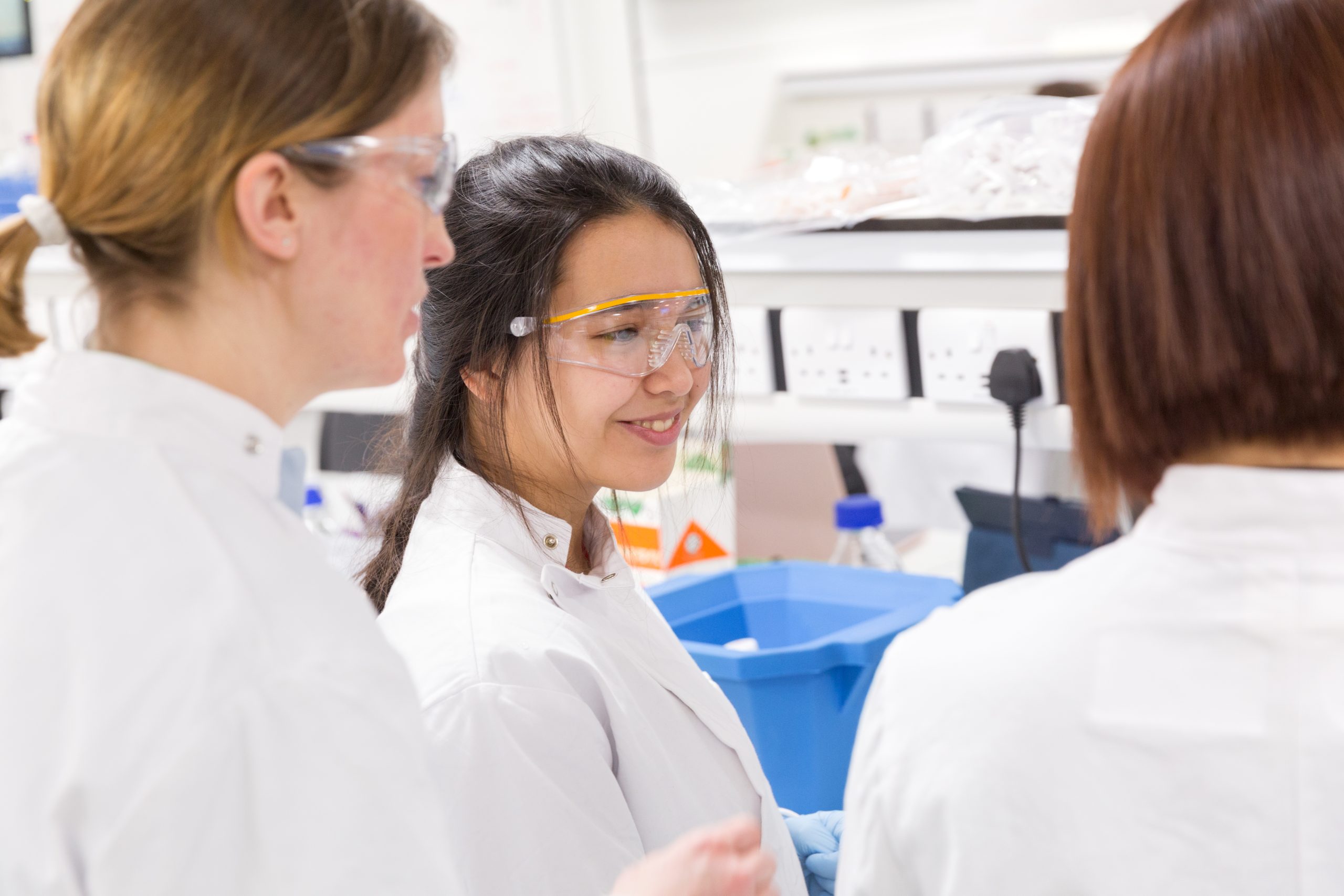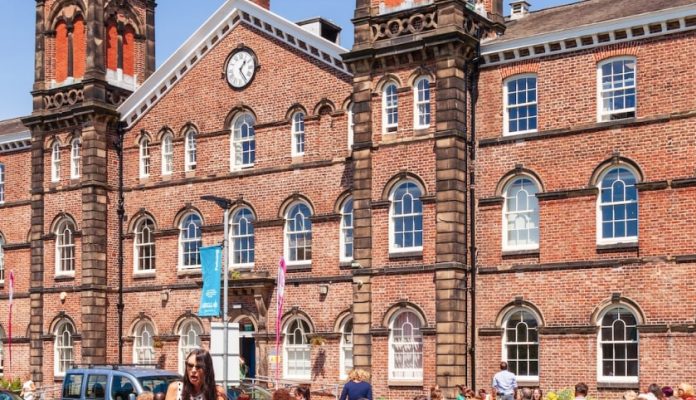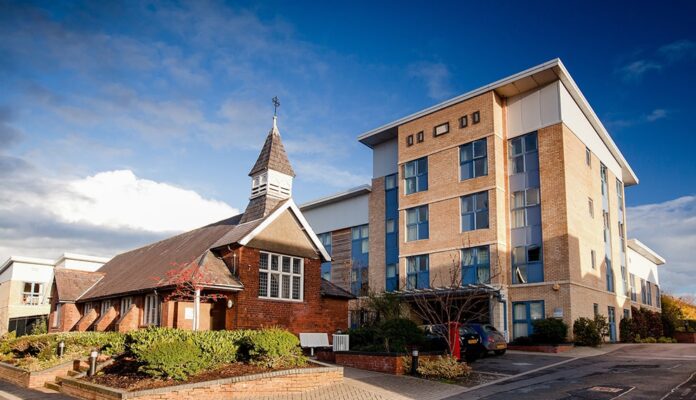Medicine – Graduate Entry
(MBBS 4YFT)
A bespoke Imperial College London programme delivered in Cumbria, in collaboration with the University of Cumbria. The degree is awarded by Imperial College London. Study Medicine at a collaborative and inclusive medical school embedded in the communities of Cumbria, training clinicians who are innovative, adaptable and focussed on the delivery of high-quality person-centred care.
- Start date: August 2026
- Duration: 4 years
- Fees: Information on tuition fees
- UCAS Code: A102
- Location: University of Cumbria Fusehill Street campus, Carlisle, and placement providers throughout Cumbria
- Delivered by: The Pears Cumbria School of Medicine
- Degree awarded by: Imperial College London
- Eligibility: Only open to home students

This MBBS programme is subject to ongoing quality assurance by the General Medical Council who are responsible for the monitoring standard of medical education in the UK
Applications Open
Applications for our 2026 Graduate Entry Medicine Programme are now closed.
Course Overview
The bespoke programme blends expertise from the highly rated MBBS programme at Imperial College London, with the University of Cumbria’s longstanding reputation in training allied healthcare professionals.
You will gain early exposure to clinical practice alongside research-informed medical sciences teaching. You will also complete a community-based project on a topic of interest to you, linked with prevention and healthcare delivery. Clinical skills training and multi-professional collaborative learning will occur across the 4-year programme.
A professional development programme will support your academic progress and career development. You will be allocated a tutor with clinical experience in Cumbria and be given access to resources to structure your learning.
You will need to be a home student with at least an upper second-class science or allied healthcare degree to be considered. Successful students will graduate with an MBBS from Imperial College London.
To encourage applications from groups less well represented in medicine and as part of our commitment to widening access, this 4-year graduate programme does not have any GCSE or A-level requirements.
The new Pears Cumbria School of Medicine is a collaboration between the University of Cumbria and Imperial College London.
The University of Cumbria is no.1 in the Northwest for Graduates into employment or further study within 15 months – (97% of Graduates - HESA 2023).
Imperial College London is ranked 2nd in the world in the overall rankings and 8th in the world for Medicine (QS World University Rankings 2025).
Join us for an open day
Don’t miss out on this opportunity to take a closer look at Pears Cumbria School of Medicine. Register now and embark on your journey towards a fulfilling career in medicine.
Course Structure
Year 1 will focus on the integration of medical science and clinical knowledge, while you begin to develop the professional values and behaviours needed to become a doctor.
From early in the programme, you will undertake clinical placements and clinical simulation in a range of settings across North and South Cumbria, which may necessitate travel and/or temporary accommodation.
These sessions will enable you to develop your practical procedural, clinical and communication skills. You will also explore the contributing factors to health and healthcare delivery. There will be a focus on the application of research to healthcare delivery.
Modules
-
Medical Sciences 1
Explore the anatomy and physiology of the major organ systems with a focus on how pathophysiology underpins disease.
-
Prevention and Healthcare Delivery 1
Explore the social, psychological, and behavioural factors that contribute to health and healthcare delivery.
-
Clinical Skills and Professional Practice 1
Develop your clinical skills and professionalism and explore the roles and responsibilities of a medical student and a doctor.
Year 2
Year 2 will delve deeper into medical sciences with continuing focus on the integration of medical science and clinical knowledge, widening your clinical knowledge, and further building on your professional values and behaviours.
The clinical learning in primary and secondary care settings will increase, allowing further development of your practical procedural, clinical and communication skills.
You will deepen your understanding of the factors contributing to health and healthcare delivery completing a group project in an area of interest to you.
Modules
-
Medical Sciences 2
Integrate the key concepts introduced in Medical Sciences 1 to adopt an evidence-informed approach to managing patients with multiple long-term conditions.
-
Clinical Skills and Professional Practice 2
Further develop your clinical skills and professionalism; undertake clinical placements across the region, in general practice, community and mental health, and medical and surgical secondary care.
-
Prevention and Healthcare Delivery 2
Deepen your understanding of the key concepts in social sciences and population health, while considering the practical aspects of applying research and healthcare data to improve health outcomes.
Year 3 - 4
Years 3 and 4 are centred on your preparation for practice as a Foundation Doctor in the NHS.
In Years 3 and 4, you will undertake clinical placements in clinical specialties, medicine, and surgery, based in hospital and community settings. These placements will facilitate the integration of your learning within the medical school, and in the clinical settings, to prepare you for practice.
In addition to being embedded in clinical teams, a range of structured teaching and simulation sessions will provide you with added experience of unfamiliar situations, managing uncertainty to support you in your practise e.g., making clinical decisions.
During your final year, there will be the preparation for practice component. This will contain a pre-foundation assistantship, during which you will have a defined role and responsibilities within a local clinical team where you will participate in activities which are like those of a newly qualified doctor.
You will complete your training with an elective period that will enable you to organise your own extended placement, either in the UK or abroad.
You will need to complete all components of the Medicine (Graduate Entry) programme to a satisfactory standard to obtain your MBBS award.
Year 3 Modules
-
Clinical Skills and Professional Practice 3
Experience situational learning on clinical placement across the region, in a range of specialties, in both community and secondary care.
Year 4 Modules
-
Clinical Skills and Professional Practice 4
Builds further on the clinical skills, the professional capabilities, and the knowledge that is required for the Medical Licencing Assessment. The module also includes a pre-foundation assistantship and an elective period.
Your timetable and learning
Our timetable is structured to allow you to focus on your Professional Knowledge, Clinical Skills, Professional Values and Behaviours at specific times.
We will use active learning methods so you can practise and apply your knowledge and critical thinking.
Assessment
A variety of assessment modes will be used, specific to the aims of each module in each academic year. These include, but are not restricted to, written, clinical and oral examinations.
You will also undertake Workplace Based assessments, which examine clinical skills or practical procedures, undertaken in simulated circumstances, and/or in a clinical setting.
Assessments will take place in class and/or online; they may be open or closed book. Assessments for the MBBS programme are pass/fail. You will receive regular feedback through formative assessments that will allow you to track your progress and prepare for the summative assessments.
Medical Licensing Assessment
The General Medical Council’s Medical Licensing Assessment (MLA) aims to demonstrate that those who obtain registration with a licence to practise medicine in the UK meet a common threshold for safe practice. To obtain registration with a licence to practise, you will need to pass both parts of the MLA and demonstrate your fitness to practise.
Student agreement
Due to the unique nature of Medicine programme, which emphasises clinical placements, all students will be asked to sign an agreement upon entry, which sets out the responsibilities of both Pears Cumbria School of Medicine and the student.
The agreement complements Imperial College London’s current policies and procedures, promoting a coherent understanding between students and the Pears Cumbria School of Medicine Faculty as to what is expected from each, and improving the student’s learning experience.
Placements and location of study
The programme is based at the Pears Cumbria School of Medicine, at the University of Cumbria, Fusehill Street Campus, Carlisle.
You will complete a number of clinical placements throughout your degree in partner NHS organisations.
From early in the programme, you will undertake a range of short clinical placements and simulation. These will be across North and South Cumbria, in community, primary and secondary care settings, including mental health.
During the programme you will be expected to complete placements in both north and south Cumbria areas which may necessitate travel and/or temporary accommodation.
Towards the end of the programme, you will undertake a period of pre-foundation assistantship during which you will be embedded in a clinical team locally; and an elective, where you will organise your own extended placement, either in the UK or abroad.
Staff expertise
You will be taught by a range of teachers from Professors to local health care experts, plus specialists external to Imperial College London and the University of Cumbria. You may also experience peer teaching.
University of Cumbria Campus, library, and facilities
Based at the University of Cumbria’s Carlisle Fusehill Street Campus you will study alongside students undertaking to a wide variety of different programmes. You’ll find a bustling environment for students offering multiple spaces to use for socialising and meeting with friends.
A 10-minute walk from the centre of Carlisle the campus allows students to enjoy the facilities at Fusehill Street whilst having the flexibility to easily access the city centre.
Our libraries offer you flexible, accessible, and safe spaces. Our excellent range of digital and physical library resources support your learning.
Our Skills@Cumbria team support your library, academic and digital skills development throughout your programme of study.
Library and academic advisors team provide online resources, including our Skills TV channel, webinars , group workshops, individual appointments and email guidance to support you with searching, writing, referencing, presenting, dissertations and more.
For further information, please refer to our facilities page.
Disability support at the University of Cumbria
Disability support will be provided to the Pears Cumbria School of Medicine students by the University of Cumbria.
The University of Cumbria is committed to supporting disabled students to participate in their programmes of study. The University seeks to embed policies and procedures which promote disability equality and offer support through the provision of reasonable adjustments.
Students are encouraged to declare Disabilities/Specific Learning Difficulties within the admission processes e.g., on their application form or UCAS forms, and during your registration and enrolment processes. By declaring information within these processes, the University of Cumbria can send students specific information and contact them to discuss needs.
Our Disability Support teams will work with you to develop your learner support plan detailing your needs and required and recommended adjustments which will be shared with your programme tutor. Our Specialist Learning Advisors provide support, information, resources, and appointments for students with specific learning difficulties you will have access to a range of specialist equipment, hardware, and software dependent on your specific needs.
On each campus, you will find accessible workstations with specialist hardware such as larger screens, keyboards, and adjustable height desks. All computers have access to a range of assistive software and a selection of over 100 free accessibility apps for everyone to use.
Further details are available on our disability support page.
University of Cumbria Student Accommodation
With a bustling city centre, beautiful surroundings and a wealth of history, Carlisle is a fantastic place to live and study.
University of Cumbria offers both on and off campus accommodation, with a range of room preferences and price range. Campus accommodation, Carrock Halls Fusehill Street, offer modern, stylish affordable ensuite accommodation, organised into flats of 5-7 rooms per flat. Our nominated accommodation provider, Denton Holme Student Village, offers riverside views and is a short 20-minute walk from the Fusehill Street campus and city centre. Ensuite and standard single rooms are offered in townhouse settings, with resident parking and bike storage facilities.
Accommodation contracts for medical students will be 46 weeks, so you do not need to vacate your room at Christmas or Easter. Further contract extensions over the summer can usually be facilitated. Applications can be made for both accommodation options via University Accommodation online application portal, however, please note that contracts for Denton Holme Student Village are managed directly by their Host Team.
First year accommodation is guaranteed for applicants who select the Pears Cumbria School of Medicine as their first choice through UCAS, subject to an accommodation application being submitted to University of Cumbria by 30 June. We will also endeavour to provide accommodation for enrolled Students in years 2–4 of the Programme, subject to forecast availability and an accommodation application being submitted to University of Cumbria by 30 June for the academic year ahead.
For further information on our accommodation offer, please visit our accommodation page.
Detailed FAQs can be found on the University of Cumbria website: Frequently asked questions | University of Cumbria
Entry Requirements
Student status
Students apply to Imperial College London. Currently, PCSM can accept applications only from prospective students who are considered a home student for fee purposes.
Academic requirements
Minimum entry standards - Graduate Entry
A grade 2:1 (or above) in a Biosciences or Allied Healthcare degree.
Examples of relevant UK* biological or allied health professional subjects as relevant to the academic admissions criteria are:
- Anatomy/Anatomical Science
- Biochemistry
- Bioengineering
- Biology
- Biomedical/Healthcare Science
- Cell and/or Molecular Biology
- Clinical Sciences
- Dietetics and Nutrition
- Dentistry
- Genetics
- Health & Social Care
- Medical Sciences
- Microbiology
- Midwifery
- Neuroscience
- Nursing
- Physiotherapy
- Paramedic Practice/Science
- Pharmacy
- Pharmacology
- Physiology
- Psychology
- Public Health
- Radiography
- Sports Science/Rehabilitation
- Occupational Therapy/Health
- Veterinary Science/Medicine
This list is not intended to be exhaustive. If your degree title is not listed or was awarded by an institution outside the UK, contact the admissions team to check suitability.
Admissions tests
All applicants are required to meet a minimum threshold score in either the Graduate Medical School Admissions Test (GAMSAT) or the University Clinical Aptitude Test (UCAT).
The GAMSAT must be taken within the two years prior to the applicant’s UCAS submission date. The UCAT must be taken in the same year as the applicant’s UCAS submission date. The results will be made available to the admissions team in the November prior to the applicant’s intended entry to the programme.
For 2026 entry the following thresholds were applied:
UCAT Threshold for Home Applicants
- Minimum threshold Total Score: 1960
UCAT Thresholds for Contextual Applicants
- Minimum threshold total Score: 1910
GAMSAT Threshold for Home Applicants
- Minimum threshold Total Score: 59
GAMSAT Thresholds for Contextual Applicants
- Minimum threshold total Score: 53
Please note: UCAT scores for 2026 entry are different due to the removal of the abstract reasoning section. This means that the test scores have a lower maximum total score (2700 rather than 3600).
English language requirements
Higher Requirement.
Students with a degree from the UK or one of a number of other English speaking countries are exempt from the English language requirement.
Equality of access
We are an inclusive medical school actively working to remove barriers to study medicine.
We believe in providing equal opportunities for aspiring doctors from marginalised backgrounds. We have implemented measures in the application process to ensure more accessible pathways into medical education.
Candidates who meet the College’s contextual admissions criteria are required to meet a lower minimum threshold score (a contextual score) in the GAMSAT or UCAT admissions tests.
Information about who is eligible for consideration is available here
If you believe you have mitigating circumstances for assessments during your undergraduate degree, these should be submitted to the awarding institution who will review your circumstances and make adjustments in line with their own policies. At PCSM, we require a 2:1 (or equivalent) in a relevant subject, and we do not adjust our academic entry requirements on the basis of mitigating circumstances.
If you have mitigating circumstances in relation to your UCAT or GAMSAT test, you should inform the test administering body, who will be able to advise on their policies.
If you have mitigating circumstances at the interview stage, you should inform the PCSM Admissions Officer at the earliest opportunity as these will be reviewed and may be taken into consideration for borderline candidates.
It is essential that you apply for mitigating circumstances as soon as you are aware of the problem.
Late claims will not be considered without clear supporting evidence of why an application was not made on or before the deadline.
When applying, declare disabilities and/or specific learning difficulties within your UCAS application. By declaring information within the application process, the University of Cumbria can contact you with specific information and discuss your needs.
Our disability support teams will work with you to develop your learner support plan detailing your needs and required adjustments, which will be shared with your programme tutor.
Our Specialist Learning Advisors provide:
- Support
- Information
- Resources
- Appointments for students with specific learning difficulties
You will have access to a range of:
- Specialist equipment
- Hardware
- Software dependent on your specific needs
If you would like advice about your individual circumstances before applying, please email: cumbriamedadmissions@cumbria.ac.uk. .
For further information, please refer to the University of Cumbria’s Disability Support Information.
The General Medical Council has guidance about individuals with disabilities studying for and practising medicine.
You may be eligible for additional funding via Disabled Student Allowance.
This information is subject to change, find out more on Imperial’s Website.
Stay Connected
Applications will be via UCAS and will open in 2025 for 2026 entry.

Life in Cumbria
With a bustling city centre, beautiful surroundings and a wealth of history, Carlisle is an incredible place to live and study.
Find out more
Accommodation
Explore Denton Holme Student Village, with 249 modern rooms available, all within walking distance from Fusehill Street campus.
Find out more
Disability support
We are committed to supporting disabled students and fostering an inclusive campus. Our team will develop an individualised action plan to ensure you receive the necessary support.
Find out moreYour career as a doctor
Diverse range of careers
Graduate with the skills and knowledge to enter a diverse range of careers including clinical medical practice, clinical and biomedical research, the pharmaceutical industry, scientific journalism, and healthcare management.
Access to specialist career support
Access the specialist careers support from the Imperial College London medical school careers team, alongside the support offered through your professional development tutor and other medical school staff. Including one-to-one appointments, talks from doctors in different specialities, skill sessions, networking events and careers fairs, and much more.
Achieve a primary medical qualification (PMQ)
Achieving this MBBS provides you with a primary medical qualification (PMQ), entitling you to provisional registration with the GMC and licence to practise in approved Foundation Year 1 posts. In your final year, we will support you to apply for a Foundation Year 1 post through the UK Foundation Programme selection scheme.
Progress through foundation programmes
On successful completion of the Foundation Year 1 programme, you can apply for full registration with the GMC before entering Foundation Year 2.
Obtain a full registration with a licence to practise
As a doctor you’ll need full registration with a licence to practise for unsupervised medical practise in the NHS or UK private practice, although regulations in this area are subject to change. Then, you can train as a specialist through an NHS scheme, choosing from around seventy different specialities.
Terms and conditions
There are some important pieces of information you should be aware of when applying to Imperial. These include key information about your tuition fees, funding, visas, accommodation and more.
Read our terms and conditions
Contact us
For enquiries on Admissions please email us at cumbriamedadmissions@cumbria.ac.uk